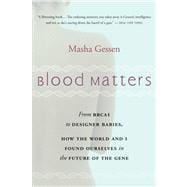
Note: Supplemental materials are not guaranteed with Rental or Used book purchases.
Purchase Benefits
What is included with this book?
| The Past | |
| My Mother's Fatal Flaw | p. 3 |
| The Four Mothers of Jewsp15 | |
| The Post-Nazi Era | p. 57 |
| The Present | |
| Indecision | p. 71 |
| A Decision at Any Cost | p. 78 |
| The Father of Hereditary Cancers | p. 117 |
| The Cruelest Disease | p. 139 |
| The Science of Matchmaking | p. 166 |
| The Operation | p. 191 |
| The Future | |
| The Future the Old-Fashioned Way | p. 199 |
| Biobabble | p. 238 |
| What We Fear Most | p. 264 |
| Acknowledgments | p. 283 |
| Glossary of Key Terms | p. 285 |
| Notes on Sources | p. 289 |
| Index | p. 309 |
| Table of Contents provided by Ingram. All Rights Reserved. |
The New copy of this book will include any supplemental materials advertised. Please check the title of the book to determine if it should include any access cards, study guides, lab manuals, CDs, etc.
The Used, Rental and eBook copies of this book are not guaranteed to include any supplemental materials. Typically, only the book itself is included. This is true even if the title states it includes any access cards, study guides, lab manuals, CDs, etc.